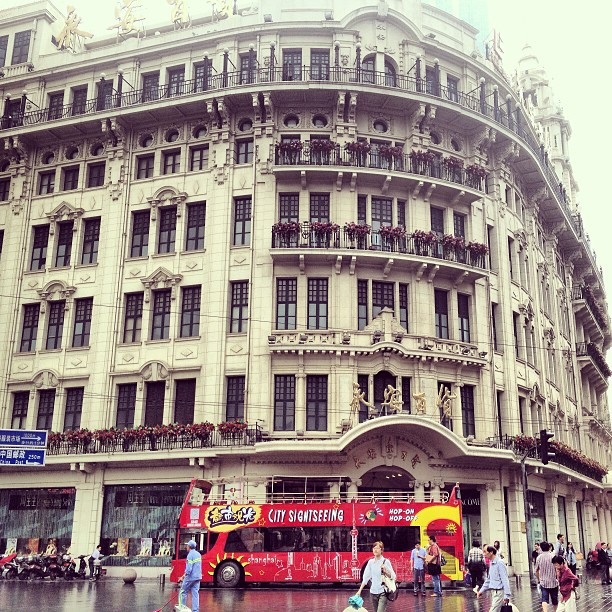The Chinese diaspora dividend

Wing On Department Store, NanJing Road Shanghai via Flickr user Lawrence Wang 王治钧
In the 1930s, Shanghai was regarded as the Paris of the Orient. The city was famous for its neon lights, jazz music and raging social scenes. It was also a place where tsarist aristocrats, communists and Jewish refugees took sanctuary in foreign concessions.
Along the famous shopping strip of Nanjing Road, four great department stores -- Sincere, Wing On, Sun Sun and the Sun Company -- dominated the landscape. These towering buildings boasted elaborate window displays and were modelled after the Anthony Hordern & Sons in Sydney.
These four great department stores were known as the ‘Australian stores’ because they were owned by Chinese-Australians. Sadly, these entrepreneurs are forgotten outside of their families, according to a wonderful book Big White Lie: Chinese Australians in White Australia by Professor John Fitzgerald of Swinburne University.
“Whenever a train reached the outer suburbs of Shanghai, or a boat turned into the Huangpu River, away in the distance all of the passengers could see the tall spires and gleaming lights of the four great companies,” said Charles Lee, son of the Sun Sun founder and manager of Shanghai store.
Chinese Australians made up the largest group of investors in Shanghai before Mao took power in 1949 and they contributed as much as one third of total overseas Chinese investment as well as substantial outlays in Hong Kong, Singapore, Guangzhou and Tianjin.
This all-but forgotten chapter of Australian business history continues on today in a different form. There are close to one million ethnic Chinese living in Australia today according to the last census and some of them are descendants of these early entrepreneurs and gold miners from the Victorian gold rush time.
Others are of a more recent vintage and have arrived in Australia as students, business people and professionals in the last decade or so. Like the overseas Chinese communities elsewhere in the Asia Pacific region, they play an important role in forging business connections between their home countries and China.
The East Asia Analytical Unit of the Department of Foreign Affairs and Trade prepared a detailed report about the importance of overseas Chinese business network in Asia for the Government’s Standing Committee of Deputy Secretaries on East Asia in 1995. The role of Australia’s community of Chinese entrepreneurs in enhancing our economic integration with Asia was highlighted.
The diverse and growing Chinese community in Australia can contribute significantly to Australia’s economic well-being domestically, regionally and internationally, says the report. Australia’s Chinese communities can assist non-Chinese Australian businesses to trade with and invest in China, Taiwan, Hong Kong and other regional economies where the ethnic Chinese are important as suppliers, consumers, financiers and intermediaries.
One example of a Chinese Australian businessman who plays an important role in forging a bridge between two countries is George Wang, deputy chairman and executive director of the Asia Pacific Stock Exchange.
The new stock exchange seeks to attract Chinese companies to list in Australia. It will allow companies, especially small and medium sized enterprises from China, to tap into Australia’s capital market and at the same time subject them to the higher standards of corporate governance and disclosures regime here.
Chau Chak Wing is an Australian citizen and a property tycoon in China with deep connections to the highest echelons of power both in Canberra and Beijing. He was one of the largest donors to both sides of politics and gifted $25 million -- including a Frank Gehry designed building -- to the University of Technology, Sydney.
Wing played the role of facilitator to perfection when he introduced Charles Goode, the chairman of Woodside Petroleum to the governor of Guangdong in 2002. The company subsequently signed a $25 billion gas supply contract with the Guangdong provincial government, according to the Sydney Morning Herald.
It is not only Chinese tycoons who are facilitating business deals. There are thousands of Chinese Australians who work in the legal profession, accountancy, export and import businesses and investment advisory services.
Jack Xiao, who moved to Australia several years ago from Jiangsu province, is a director of a joint-venture company with China’s largest publishing house -- Phoenix Media and Publishing -- and has been active in introducing Australian cultural products such as illustrated children’s books to millions of Chinese people.
His next project is to showcase prominent members of the Chinese Australian community to China in partnership with one of the largest satellite broadcasters in the country.
Like the early Chinese Australian pioneers who built the four great Australian stores on Nanjing Road in Shanghai, thousands of Chinese Australians are playing an active part in forging a closer economic relationship between the two countries. They are like the silk thread that runs through the tapestry of Sino-Australian history.
















